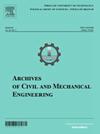A coupled thermo-mechanical model for warm single-point incremental forming process
Abstract
Single point incremental forming (SPIF) is a low-cost, low-volume forming technique that has gained the attention of researchers over the past two decades. However, it has primarily been utilized for ductile materials such as aluminum and steel alloys and has yet to be extensively explored for hard-to-form materials such as magnesium (Mg) alloys, which are widely used in aviation and automotive industries. The hexagonal close-packed structure of these alloys makes it challenging to deform at room temperature. Studies have shown that the formability of Mg alloys can be increased under warm forming conditions. The analytical model needs to be developed to understand the effect of temperature on material properties and process parameters and their dependencies on each other. The present work proposes an analytical thermal model to predict in-plane strains during the warm SPIF process of magnesium (AZ31B) alloy. A coupled thermo-mechanical numerical simulation model was developed using ABAQUS/EXPLICIT® software to estimate in-plane strains and thickness distribution. The Johnson–Cook model was applied to define the fracture criterion and the constitutive model. The predictions of the analytical and numerical models developed in this study were compared with experimental results. Further, the study investigated the impact of step depth, tool diameter, and wall angle on formability and thickness distribution. The predictions from the model developed in this study take significantly less computational time than numerical simulation analysis with an accuracy within 3% of the numerical model.

 求助内容:
求助内容: 应助结果提醒方式:
应助结果提醒方式:


